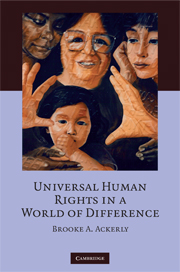Book contents
- Frontmatter
- Contents
- Acknowledgments
- 1 Universal human rights in a world of difference: challenging our thinking
- Part I Epistemology, diversity, and disagreement in theory and practice
- 2 Universal human rights?
- 3 Universalisms and differences
- 4 Immanent and universal human rights: more legitimate than reasonable
- Part II A methodology for immanent theory
- Part III Immanent universal human rights: theory and practice
- Bibliography
- Interviews
- Index
3 - Universalisms and differences
Published online by Cambridge University Press: 06 July 2010
- Frontmatter
- Contents
- Acknowledgments
- 1 Universal human rights in a world of difference: challenging our thinking
- Part I Epistemology, diversity, and disagreement in theory and practice
- 2 Universal human rights?
- 3 Universalisms and differences
- 4 Immanent and universal human rights: more legitimate than reasonable
- Part II A methodology for immanent theory
- Part III Immanent universal human rights: theory and practice
- Bibliography
- Interviews
- Index
Summary
Introduction
In this chapter I argue that normative arguments that make or rely on explicitly transcendental claims about justice (like some religious arguments) and normative arguments that use formal rules to derive claims about justice (like some philosophical arguments) exhibit a form of reasoning that conceals a particular politics, often defining that politics as apolitical or prior to politics. The first vests truth in a transcendental source and vests authority in those philosophers, theologians, and spiritual leaders who interpret the transcendental source. The second vests truth in particular ways of reasoning about truth and vests authority in those philosophers, theologians, and other leaders who are most adept at following those norms. They both have an undemocratic basis for the authority to define the norms of argument. Both approaches vest authority in intermediaries or interpreters. Each intermediary or interpreter has a potentially exploitable authority to make universalist arguments about justice. Such authority is subject to manipulation by the politics of epistemology, diversity, and dissent discussed in chapter 2. Thus, they both mask political authority as authoritative interpretation. Their political universalisms are problematic not because they are universalist but because they portend to be apolitical universals. This criticism, applicable to many approaches to human rights theory as revealed in its elaboration in this chapter, sets up the proposition explored in the following four chapters: the possibility of theorizing about universality without assuming a falsely apolitical stance.
- Type
- Chapter
- Information
- Universal Human Rights in a World of Difference , pp. 70 - 90Publisher: Cambridge University PressPrint publication year: 2008



